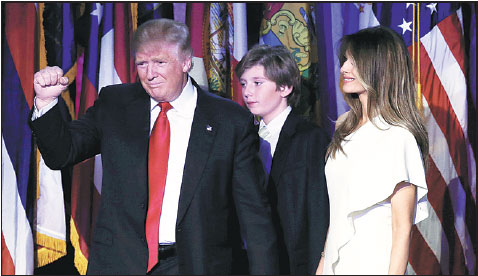Xi looks to work with Trump
Updated: 2016-11-10 08:26
By Zhao Huanxin in Beijing and Chen Weihua in Washington, Dc(China Daily)
|
||||||||
|
US president-elect Donald Trump, his son Barron and wife, Melania, greet supporters during his post-election rally in New York City early on Wednesday.Mike Segar / Reuters |
President Xi Jinping sent congratulations to US president-elect Donald Trump on Wednesday, saying he looked forward to working with him to push bilateral relations "further forward from a new starting point".
In a close race for the White House on Tuesday, Trump beat Democratic rival Hillary Clinton, surpassing the threshold of 270 of the total 538 electoral votes needed to win the presidency.
Clinton made a phone call to the Republican to concede the election.
In Xi's congratulatory message, he said the world's two largest economies bear a special responsibility for maintaining world peace and stability and boosting global development and prosperity, adding that they share extensive interests.
"I highly value the relations between China and the United States, and I am looking forward to working together with you to expand China-US cooperation in every field, at the bilateral, regional and global levels, on the basis of the principles of non-conflict, non-confrontation, mutual respect and win-win cooperation, with differences controlled in a constructive manner, so as to push China-US relations further forward from a new starting point, better benefiting the peoples of the two countries and other countries," Xi said.
Earlier on Wednesday, Foreign Ministry spokesman Lu Kang said Beijing expected to work with the new US government after Trump takes office in January to maintain sustained, healthy and stable growth of China-US relations, to benefit people in both countries and across the world.
In his victory speech, Trump said he would embark on a project to rebuild US infrastructure and would double US economic growth. He also said the nation owed Clinton "a major debt of gratitude" for her years of public service, an abrupt departure from his campaign trail rhetoric, in which he repeatedly slammed the former secretary of state as "crooked".
The elevation of the 70-year-old reality-TV and real estate mogul creates new uncertainties for the global economy, according to Huang Rihan, a researcher at the Center for China and Globalization.
"After he takes office, trade protectionism may gather steam in the US, which would disrupt trade at a time when growth is already fragile," Huang said.
The uncertainties arising from the US election sent waves through the global markets. The equity market in China fluctuated on Wednesday, with benchmark A-share and H-share indexes dipping. Analysts said the situation could last for the next few days before investors refocus on economic fundamentals.
US stock futures dived 5 percent at one point, worse than the sell-off caused by the British vote in June to leave the European Union in June that wiped trillions of dollars off world markets, Reuters reported.
During his campaign, Trump had vowed to win economic concessions from China. He pledged to slap 45 percent tariffs on imported Chinese goods.
"He will likely aggressively criticize, in rhetoric and action, China's trade policies and its 'stealing' US jobs," said Douglas Spelman, senior adviser at the Kissinger Institute on China and the United States at the Wilson Center in Washington, DC.
"Such actions could greatly complicate US-China cooperation on their many mutual interests," Spelman said.
Dong Chunling, a researcher at the China Institutes of Contemporary International Relations, said he did not envision a big reversal in China-US relations, because "with his business acumen, Trump knows China and the US need each other".
For one thing, the ongoing negotiation of a bilateral investment treaty between China and the US is not likely to be obstructed or delayed by Trump's new administration, since both sides are under pressure to stimulate their economies, according to He Jingtong, a professor of trade policy at Nankai University in Tianjin.
"The US economy still relies on big-ticket investment from China to create new market growth points in the US to boost jobs and export markets," said He. "Shutting down the BIT talk channels would not conform with the interests of both the new US federal government and local governments, especially those located in the so-called Rust Belt in the country."
Meanwhile, Republicans were set to keep control of the Senate and the House of Representatives, the Associated Press reported on Wednesday.
Zhong Nan, Liu Xuan and Wu Yiyao contributed to this story.
Contact the writers at zhaohuanxin@chinadaily.com.cn
- A foreigner's guide to Singles Day shopping spree
- China jails 49 for catastrophic Tianjin warehouse blasts
- Taobao village gets ready for shopping spree on 11/11
- Parents leave behind 9 million children in China
- 60% Chinese rich people plan to buy house overseas, US most preferred
- Lovable cub Pandora recalled 78 years later
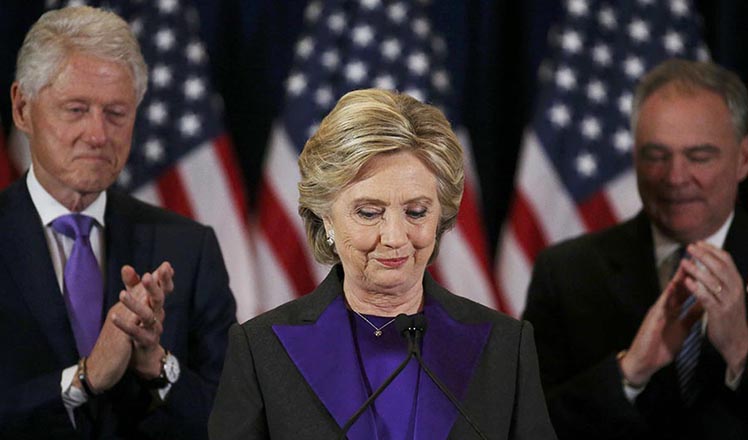
 Clinton concedes election, urges open mind on Trump
Clinton concedes election, urges open mind on Trump
 Places to enjoy golden gingko tree leaves
Places to enjoy golden gingko tree leaves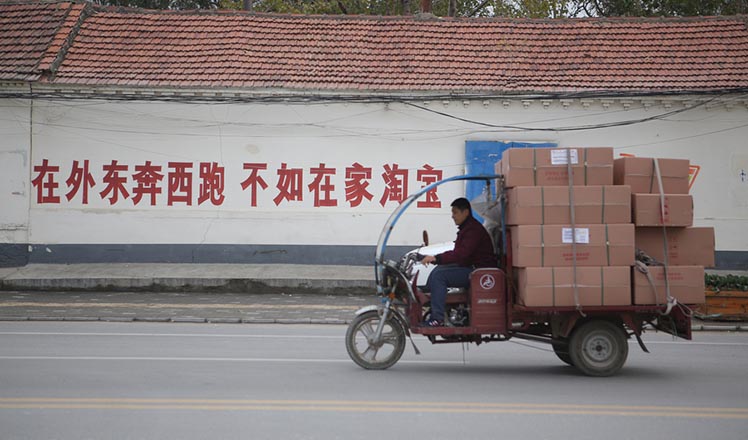
 Taobao village gets ready for shopping spree on 11/11
Taobao village gets ready for shopping spree on 11/11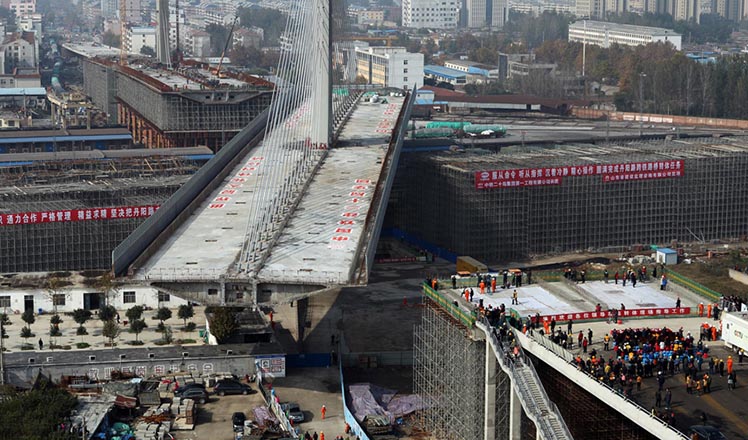
 Overhead bridge rotated in East China's Shandong
Overhead bridge rotated in East China's Shandong
 The 75th anniversary of Red Square parade celebrated
The 75th anniversary of Red Square parade celebrated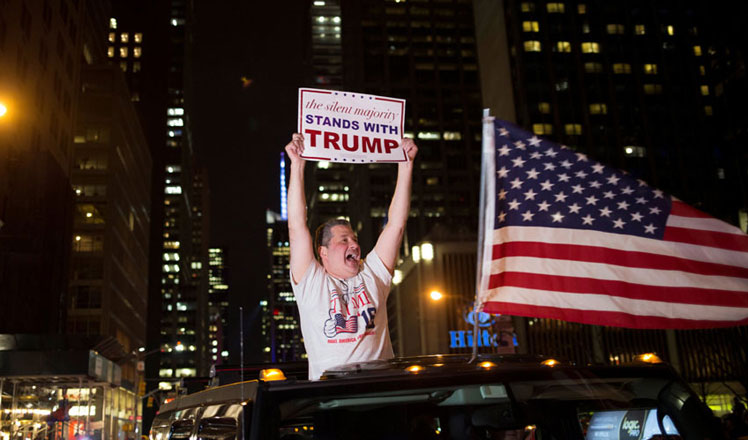
 Trump trumps Hillary: Cheers, tears and shock
Trump trumps Hillary: Cheers, tears and shock
 Bi-level bicycle storage in East China's Hangzhou
Bi-level bicycle storage in East China's Hangzhou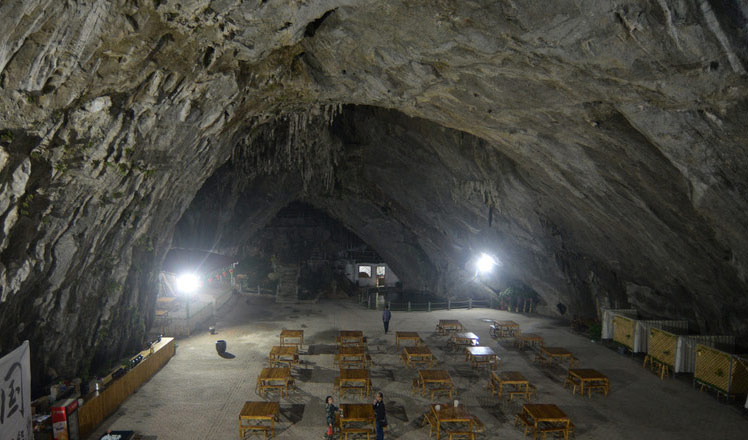
 In pics: Dine deep underground in a cave
In pics: Dine deep underground in a cave
Most Viewed
Editor's Picks

|

|

|

|

|

|
Today's Top News
US election rhetoric unlikely to foreshadow future US-China relations
'Zero Hunger Run' held in Rome
Trump outlines anti-terror plan, proposing extreme vetting for immigrants
Phelps puts spotlight on cupping
US launches airstrikes against IS targets in Libya's Sirte
Ministry slams US-Korean THAAD deployment
Two police officers shot at protest in Dallas
Abe's blame game reveals his policies failing to get results
US Weekly

|

|
